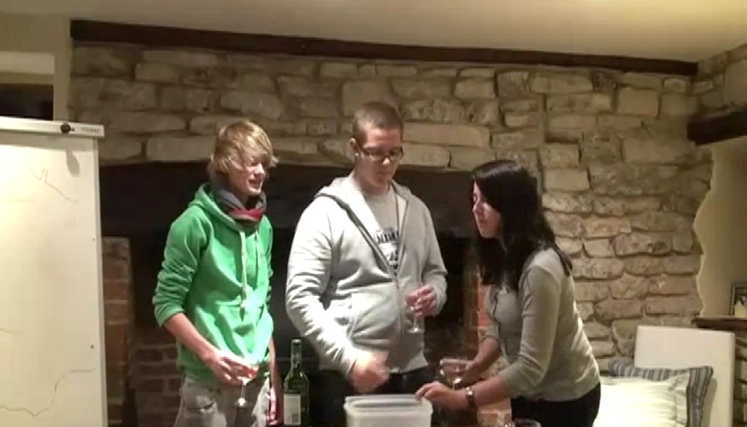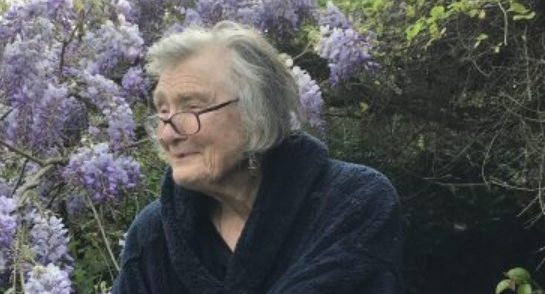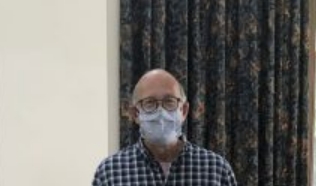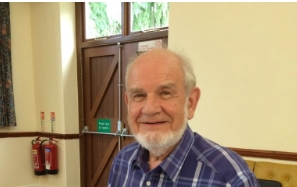Waiting for Gordo

Around 2010, the Parish Council launched an initiative called the “Parish Plan” to get feedback from villagers about the future of the village. We asked the teenagers and gave them a free rein. Five of them made this video, “Waiting for Gordo” with a nod to Samuel Beckett – clever kids. Gordo is Gordon Wilson, the popular chair of the Parish Council at that time. The video was played to a full house in the Village Hall. The five teenagers now work in professional jobs in Australia, New Zealand, Bristol and London and are still a lot of fun.
Kay Archer

Danger of 20mph Zone in Liddington There’s been talk of reducing the minimum speed through Liddington from 30mph to 20mph. Most villagers welcome it. My concern is for Kay Archer. She’s been getting around just fine with her walking stick. But when she gets into her Suzuki Carry Van she morphs into Stirling Moss. Visualise her with racing glasses and helmet, a cool driver, taking the corner at The Village Inn on to her driveway without missing a beat. 20mph? I don’t think so. Kay is an Essex girl. She came to Liddington when her father worked for the RAF building runways. Father built the house she lives in now. The original Bell Inn was where her garage is. Kay’s one regret is that the current pub was renamed The Village Inn. Perhaps Adam, the landlord, might change it back to The Bell. Kay married Basil Archer from 17 The Street in 1959 and they had two sons, Ted and Adam. She had a long career from operating a cement mixer for her father, to working in the Post Office and NHS hospital exchanges, retiring when she was 75. Her fingerprints are on building the Village Hall and sewing the Millenium map of Liddington. And she has stories. Recently she engaged me with photo albums of village life that Basil had collected. We’ll digitise them for the village web site and hopefully record the memories of all those activists. And Kay is still involved, one of the stalwarts for Village Hall events, welcoming villagers at the door, arm-wrestling them to buy raffle tickets, ever-so quiet, persistent, very much-admired. She is Liddington’s national institution. This poem, published some years back, captured a moment that was a tough loss for Kay, the passing of her husband, Basil. It was a morning in 2015 on a winter shoot. A flock of swans flew over, their sad honking had an inauspicious, spine-tingling effect. Nothing Ever Hurts You Forever That winter day on Way Sands the professional photographer clicked away but said nothing. A shade in our peripheral edge willed us to swivel to his eye away from the quick of partridge to a slow canal boat behind us and later again to a fast train, and later still to the wild swans with their ponderous wing-span honking a terse goodbye captured forever in a photograph taken over the ploughed ruts, over the half-leaved winter trees heading early morning into low sun around the hour that Basil died. If we’d known we would have seen them as a cortege carrying his life, doffed our hats to a happy re-birth before trying to find our own balance, feet mud-sucking the sodden earth.
Remembering Covid

Several villagers got Covid recently, none badly. Vaccination works. In conversation, everyone harks back to 2020 and their faded memories insist we followed the rules. My recollection is that we stretched them – a village of elderly anarchists. I loved the innovation. The Village Inn closed which meant the end of morning papers. A 6:30am run to Chiseldon (for exercise) got the paper-round back again. Often it was the only time elderly villagers had a conversation outside their home. And then there was Zoom – a first for most of us. The Wine Group had monthly sessions on Zoom. Six wines were re-distributed in “clinical conditions” into six numbered bottles which were left outside the houses. It worked, and we continued to imbibe. We catered for drinkers with a running problem. The local running group organised sessions from the Village Inn car park. Six people were allowed to meet in a bubble. Every ten minutes a bubble would arrive and head out on a pre-marked trail. There was also the serious side. Villagers shopped for seniors and had phone sessions with people who couldn’t leave their homes. The Surgery used Zoom to diagnose illnesses and volunteers delivered prescriptions. One old boy compared it to the Blitz. Our good luck was to live beside so many paths in Liddington. It was touching to watch people pat Rocky, as if they yearned for the physical contact. It was a period when we couldn’t see family. Zoom helped but what I took away was the importance of village friendships as a local family substitute. The real victims were the children. The damage to children lacking contact with playmates is now recognised. I’ve seen it with my own grandchildren. It was also tough for teenagers and young adults who missed out on dating and fooling around. There’s a lot there that’s not discussed. Maybe we’re not ready to collect everyone’s story on Covid as a historical record for the village web site, but we should. Here are a few lines from a Covid poem: I don’t know why the blue bird sang but her song soared where bells once rang, over empty pews, doors closed, the blue masks like stop signs, over the days of repetitive tasks.
Gordon Wilson

I served on the Liddington Parish Council twenty years ago when Gordon Wilson was chair. It was fun and frustrating – until the latter got the better of me. The fun was the Parish Plan. We’d an inaugural public meeting. I invited the pub landlord at that time to speak for ten minutes on why the pub should be named the Village Inn when villagers weren’t welcome. He opted out of speaking but when he saw the negative feedback from villagers he relented, allowed children in, removed “reserved” on every table, and opened a shop that sold morning papers. It was a good result for the landlord and the village. I collected feedback from the teenagers for the Plan. We made a short movie, “Waiting for Gordo,” a nod to Samuel Beckett’s play. The teenagers were great, now adults themselves and they still talk about it. Frustration at getting things done in a timely manner is the lot of parish councillors. I admire them for their patience, more patience than I have. At one meeting we discussed flooding on Purley Road. Letters were exchanged with Swindon Borough. Nothing happened, twice. Irritated, Gordon, Sid Bishop and I met at the flood with picks and shovels. We dug a trench in an hour and that was the end of the it. The Liddington logo was designed by Gordon and I got a poem out of it. It’s a tribute to Gordon for years of being chair and for his public service. Maurice Spillane As with all things Possible The stained glass window, the one you made yourself of Liddington Hill, sits on the off-side of your house like a surprise, reflecting the hill into our quiet village. I turned my car there one night, watched the light inside compete with the foraging moon, the solace of a private view. Your vision of course, your persistence, hewn by fingers that imagined colour on a drawing board within the randomness of black tracks and forged a collection of memories from coloured glass into a pastoral parallax.
David Lomax

The former chair of the Liddington Parish Council, David Lomax spent over 15 years on the Parish Council. It’s important to celebrate those who serve in our village – parish council, church committee, village hall. We depend on our volunteers. David has made his mark in several places around the village. The Phone Box for example. He and Geoff Hale in their dark and grey work suits would often be seen converting the old box to a place for a defibrillator and decorating it. He also brought us the Elephant. I loved the elephant. Unfortunately, when Joel and Vanetta Joffe left, the elephant went to a new home. The poem is called “The Footpath by the Jubilee Gardens.” David was the master designer and creator of that path. Maurice Spillane A path is never a straight line. It is living art, as a sculptor might see it, buried like a shadow in a boulder or a trunk of wood. His aim is to chip here and there to release the image into the quietness, where the pace is slower, each step a tai ’chi move in a slow, slow lane. Today, the oyster-shell edging by the spinney is safe and unsafe, a confusion of crab apples like billiard balls under your shoe, a rabbit hole and one overhead branch to challenge you, thorns like snakes from the field to deter you. This is a path for a slow lingering stroll. The old iron fencing is warped by curious cattle, wet noses agog who leaned in from Mike’s Field, but there is purchase to stare, and stare again, view the scarp by St. Andrew’s spire and tower, the grass and crops like waves across the drift, the family of roe watching you watching them, and sweep your eyes to where the kite and the buzzard reenact an aerial battle. The world is spinning around this refuge, passing time, time passing, the pretence that we’re in slow motion while everything is in a flux of change. I’ve never passed another on this path. Maybe it needs a signpost, a testament to village service while he’s still about, something simple, like “David’s Path.”


